Contents
Market Overview
Macro Review
Chair Powell garnered broader White House support for reappointment last week. Equally we would anticipate more focus on Quarles’ supervisory post which expires in October and Clarida in January, although the focus into the July FOMC will likely replace those headlines. Generally speaking, central banks won the inflation debate this week as the bond market recognized that the recent inflation spike was/is considered transitory. We note that that the 10yr U.S. Treasury yield came down from 1.72% in March to a staggering low of 1.14% and German bund yields moved from -0.17% to -0.42% over the same period. Meanwhile, the brief equity sell-off which was trigged by the bond market was short-lived and followed a swift rally (VIX also retreated after almost touching 25), where the FTSE 100 posted it’s best one-day gain in 2021. OPEC+ also finally agreed to increase production by 400k which extends to 2022, with an increase in baseline production for Saudi Arabia, Russia, UAE, Iraq and Kuwait from May 2022. BofA have subsequently reiterated their $100/bbl call for next year too. However, local markets in the Middle East with Eid ensured market activity was relatively subdued. While there were no notable shocks associated with 2Q earnings, U.S. equity funds saw the largest outflows in six weeks, while U.S. treasury inflows record the largest inflow in nine weeks. In focus were central bank events with the ECB’s policy review (given it is already forecasted to miss its new inflation target in 2023), Russia hiked rates by the largest factor since 2014 (100bp) and South Africa’s SARB meeting after recent looting/protests. On the latter, higher fiscal risk associated with the Basic Income Grant caused a sell-off in ZAR and South African credit.
EM Credit Update
EM Credit ended the week down 0.1% with spreads 6bp wider. U.S. Treasuries end the week almost 1bp tighter, but that disguises the significant volatility as 10yr rates moved from 1.30% to 1.14% then widened 14bp back to 1.29%. In secondary markets, Tunisia, Sri Lanka and Suriname outperformed, while Lithuania, Ivory Coast and El Salvador lagged.
The Week Ahead
The key event next week will shift to the FOMC after the ECB’s policy review last Thursday. Recent fragility in markets ought to keep the Fed on the back foot but the door is ajar for further tapering discussions, with a clearer timetable expected in August at Jackson Hole. Aside from the FOMC, we expect rate decisions out of Colombia (1.75%), Ghana (13.5%), Hungary (0.9%), Kenya (7.0%) and Nigeria (11.5%). We also expect to seeing a mild softening in Chinese manufacturing PMIs, elevated and double-digit trade data out of Hong Kong and GDP prints from Mexico and South Korea. Beyond that, Pedro Castillo takes office in Peru as the country’s new president and the Tokyo Summer Olympics 2020 kicks off in full swing.
Highlights from emerging markets discussed below include: Peru electoral council confirms Castillo presidency; Province of Buenos Aires improves restructuring offer although deal risk lingers; high frequency sovereign activity and fiscal data mixed; and Escalating political crisis in Lebanon points to an increasingly binary outlook
Fixed Income
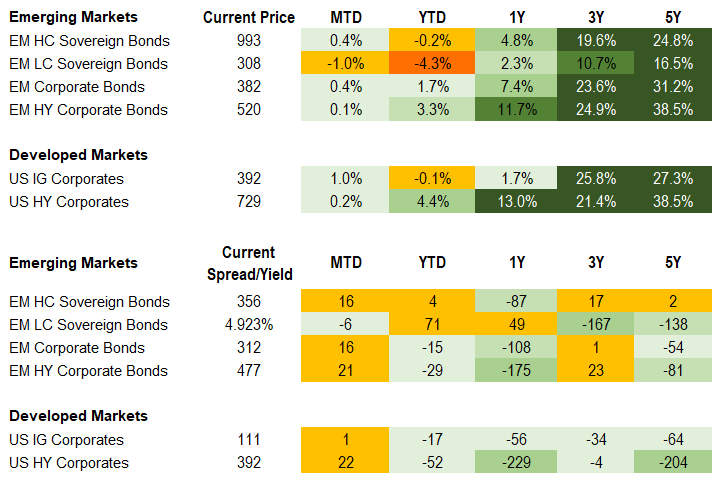
Equities
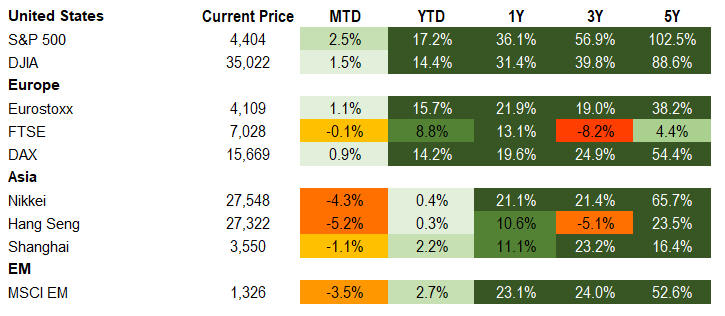
Commodities

Source for data tables: Bloomberg, JPMorgan, Gramercy. EM Fixed Income is represented by the following JPMorgan Indicies: EMBI Global, GBI-EM Global Diversified, CEMBI Broad Diversified and CEMBI Broad High Yield. DM Fixed Income is represented by the JPMorgan JULI Total Return Index and Domestic High Yield Index. Fixed Income, Equity and Commodity data is as of July 23, 2021 (Mid Afternoon).
Emerging Markets Weekly Highlights
Peru electoral council confirms Castillo presidency
Event: The National Jury of Elections validated the June 6th second round presidential election victory of outside leftist candidate, Pedro Castillo, with 50.1% of votes, roughly 40k more than contender, Keiko Fujimori. Fujimori stated she would recognize the votes albeit reiterated her claim of inconsistencies. The new administration will take office on July 28th.
Gramercy Commentary: Uncertainty remains high despite the largely anticipated validation of Castillo’s victory while investors await clarity on cabinet appointments as well as more specifics on policy agenda. Following what appeared to be an attempt by Castillo’s main economic advisor, Pedro Francke, to establish an initial dialogue and relationship with investors, expectation has centered around his potential role as Finance Minister. Francke’s somewhat moderated rhetoric and desire to preserve continuity at BCRP have helped to stabilize markets. We remain of the view that the policymaking backdrop will be challenging amid a divided Congress and a polarized population with the potential for distortive policies at the micro level and prospects for attempted preservation of headline credit metrics. However, erosion will likely occur over the medium-term with the speed and scope dependent on the ultimate policy framework. We believe risks are tilted to the downside for Peruvian assets, particularly in the local market, despite prospects for near-term tactical improvement absent cabinet surprises.
Province of Buenos Aires improves restructuring offer although deal risk lingers; high frequency sovereign activity and fiscal data mixed
Event: This week, the Province of Buenos Aires announced that it reached an agreement with some creditors following an improvement to its restructuring terms and an amended tender deadline of August 13th. The focus remains on cash flow versus stock relief with no nominal haircut on principal or PDI with an estimated recovery value including PDI of roughly 50 cents, assuming an exit yield of around 18%. The Ad Hoc Bondholder Group has released a statement indicating that it does not endorse this deal and negotiations will continue. Meanwhile, the sovereign’s 1H fiscal accounts remained in solid shape with a primary deficit of 0.5% of GDP while the June trade surplus ($1.1bn) and May monthly economic activity (-2.0% m/m) moderated relative to the prior month.
Gramercy Commentary: While a deal inches closer in the backdrop of an agreement with select bondholders, uncertainty persists over CAC thresholds due to lack of consensus among other creditors. The attractiveness of higher current yields relative to the sovereign will likely be partially offset by political uncertainty and risk post restructuring. On the sovereign high frequency data, solid 1H fiscal performance leaves the government in a stronger position than previously envisaged to manage through a more difficult 2H due to seasonal and political factors. We continue to expect the fiscal accounts to be below or in line with the budget target of 4.5% of GDP, despite lower revenues and higher expenses through year-end. Recent softening in economic activity poses some downside risk to this view albeit vaccination momentum with over 50% of the population partially vaccinated and over 12% fully vaccinated helps mitigate concerns.
Escalating political crisis in Lebanon points to an increasingly binary outlook
Event: After months of futile attempts to find a political compromise over government formation, PM-designate Saad Hariri resigned, likely plunging Lebanon into even deeper political and social turmoil, amid an already severe economic crisis.
Gramercy Commentary: Michel Aoun, Lebanon’s president, has already signaled his intention to search for another figure to replace Hariri that could be acceptable within the country’s highly complex sectarian political system. This will be a difficult task and we are not optimistic that a functioning government can be formed before parliamentary elections scheduled for May 2022. As such, the political and administrative paralysis in Lebanon is likely to continue for many more months amid already severe and deteriorating economic and social crises. Lebanon will likely receive close to $0.9bn in fresh external funds from the IMF’s new SDR (Special Drawing Rights) allocation, which should provide some modest liquidity relief in the near-term, but unfortunately, such funds are only a drop in the bucket in the context of the ongoing financial and economic collapse. Against that backdrop and the latest political developments, the country appears, more than ever, at crossroads between two divergent scenarios. A more constructive scenario hinges on a complete reset of the political system. It will almost certainly be a volatile, challenging and difficult process, but could eventually open the door for sizable rescue financing from multilateral (IMF, World Bank) and bilateral sources as well as a sovereign debt restructuring. Such a scenario will most likely also require some sort of geopolitical “grand bargain” or other arrangement involving the U.S., Saudi Arabia, Iran, Israel, and France, among others. In the absence of a constructive political reset within the next 12-18 months, further slippage toward a “failed state” scenario unfortunately looks increasingly likely, with materially negative social, economic and financial repercussions.
Emerging Markets Technicals
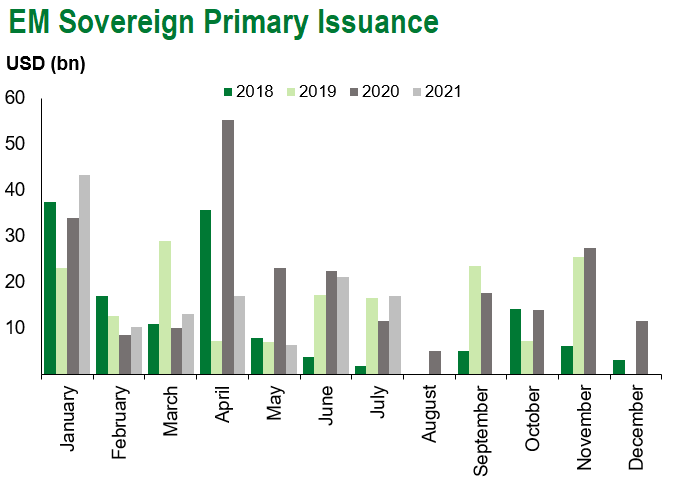
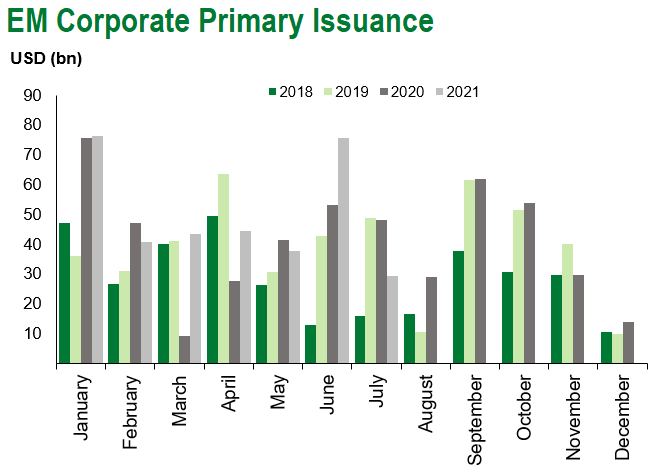
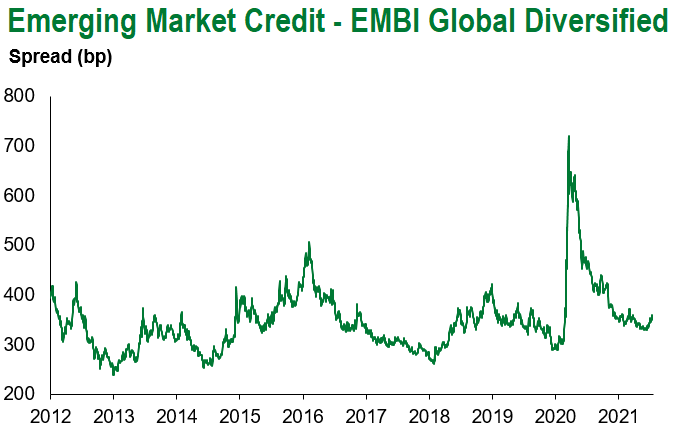
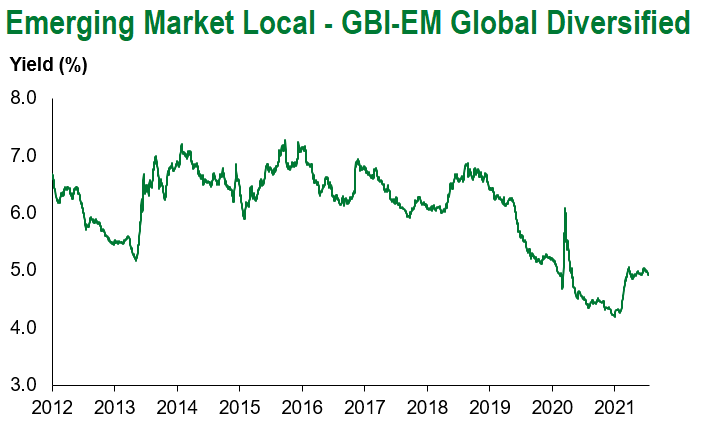
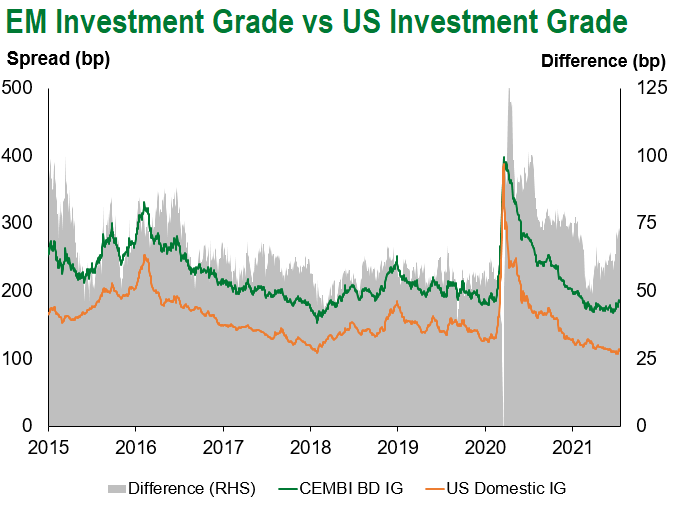
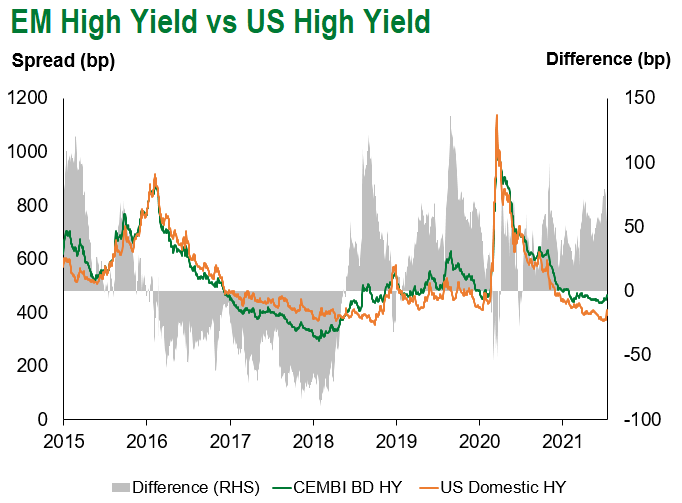
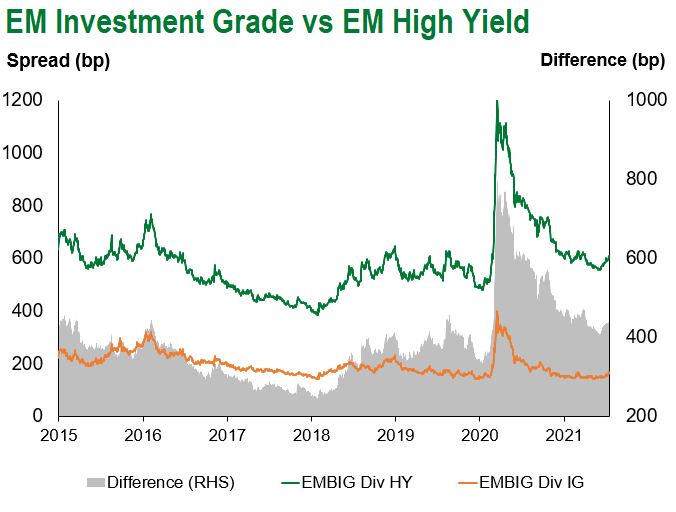
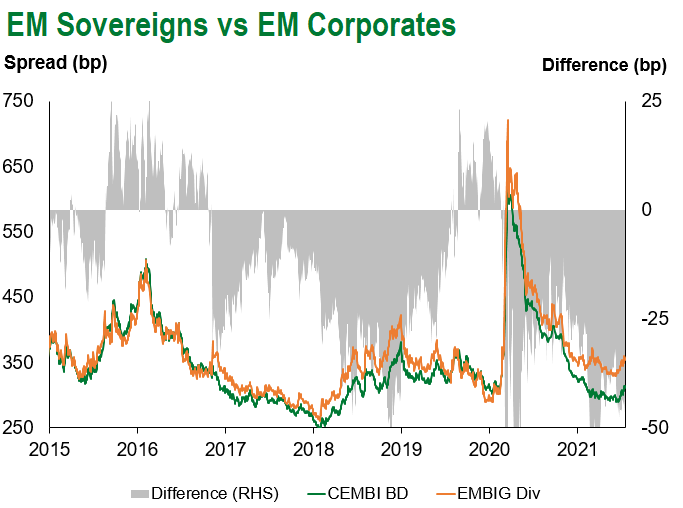
Emerging Markets Flows
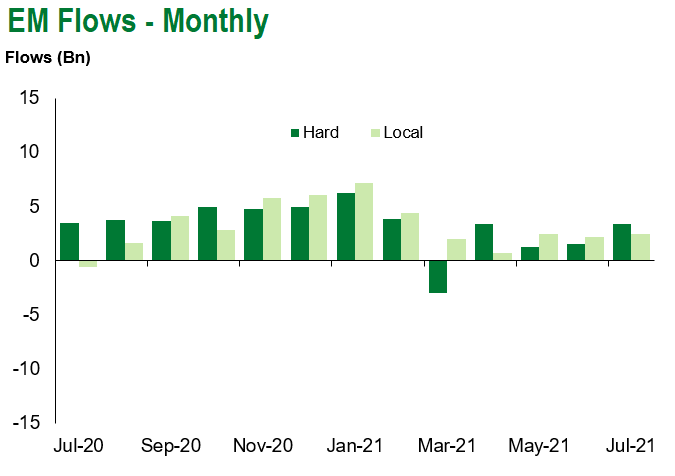
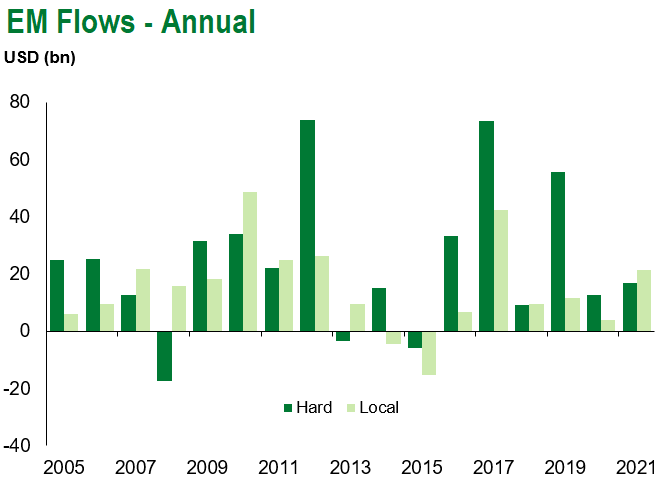
Source for graphs: Bloomberg, JPMorgan, Gramercy. As of July 23, 2021.
COVID Resources
Emerging Markets COVID-19 Case Summary
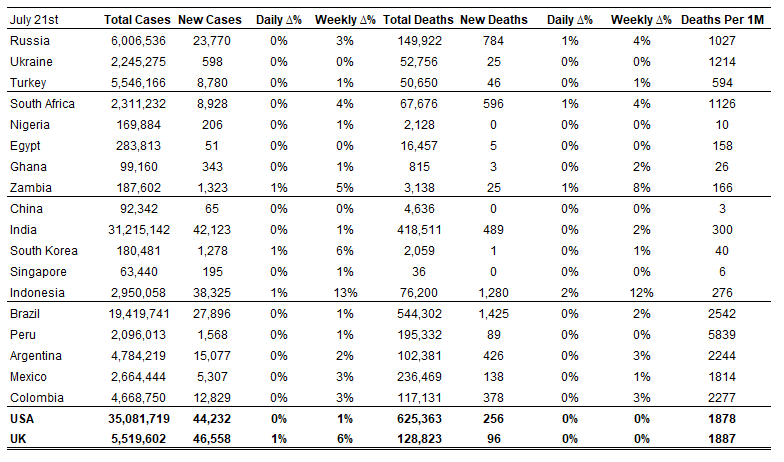
Source: Worldometer as of July 23, 2021.
Additional Crisis Resources:
Johns Hopkins COVID-19 Case Tracker
For questions, please contact:
Kathryn Exum, Senior Vice President, Sovereign Research Analyst, [email protected]
Petar Atanasov, Senior Vice President, Sovereign Research Analyst, [email protected]
Tolu Alamutu, CFA, Senior Vice President, Corporate Research Analyst, [email protected]
James Barry, Vice President, Corporate Research Analyst, [email protected]
This document is for informational purposes only. The information presented is not intended to be relied upon as a forecast, research or investment advice, and is not a recommendation, offer or solicitation to buy or sell any securities or to adopt any investment strategy. Gramercy may have current investment positions in the securities or sovereigns mentioned above. The information and opinions contained in this paper are as of the date of initial publication, derived from proprietary and nonproprietary sources deemed by Gramercy to be reliable, are not necessarily all-inclusive and are not guaranteed as to accuracy. This paper may contain “forward-looking” information that is not purely historical in nature. Such information may include, among other things, projections and forecasts. There is no guarantee that any forecasts made will come to pass. Reliance upon information in this paper is at the sole discretion of the reader. You should not rely on this presentation as the basis upon which to make an investment decision. Investment involves risk. There can be no assurance that investment objectives will be achieved. Investors must be prepared to bear the risk of a total loss of their investment. These risks are often heightened for investments in emerging/developing markets or smaller capital markets. International investing involves risks, including risks related to foreign currency, limited liquidity, less government regulation, and the possibility of substantial volatility due to adverse political, economic or other developments. The information provided herein is neither tax nor legal advice. Investors should speak to their tax professional for specific information regarding their tax situation.